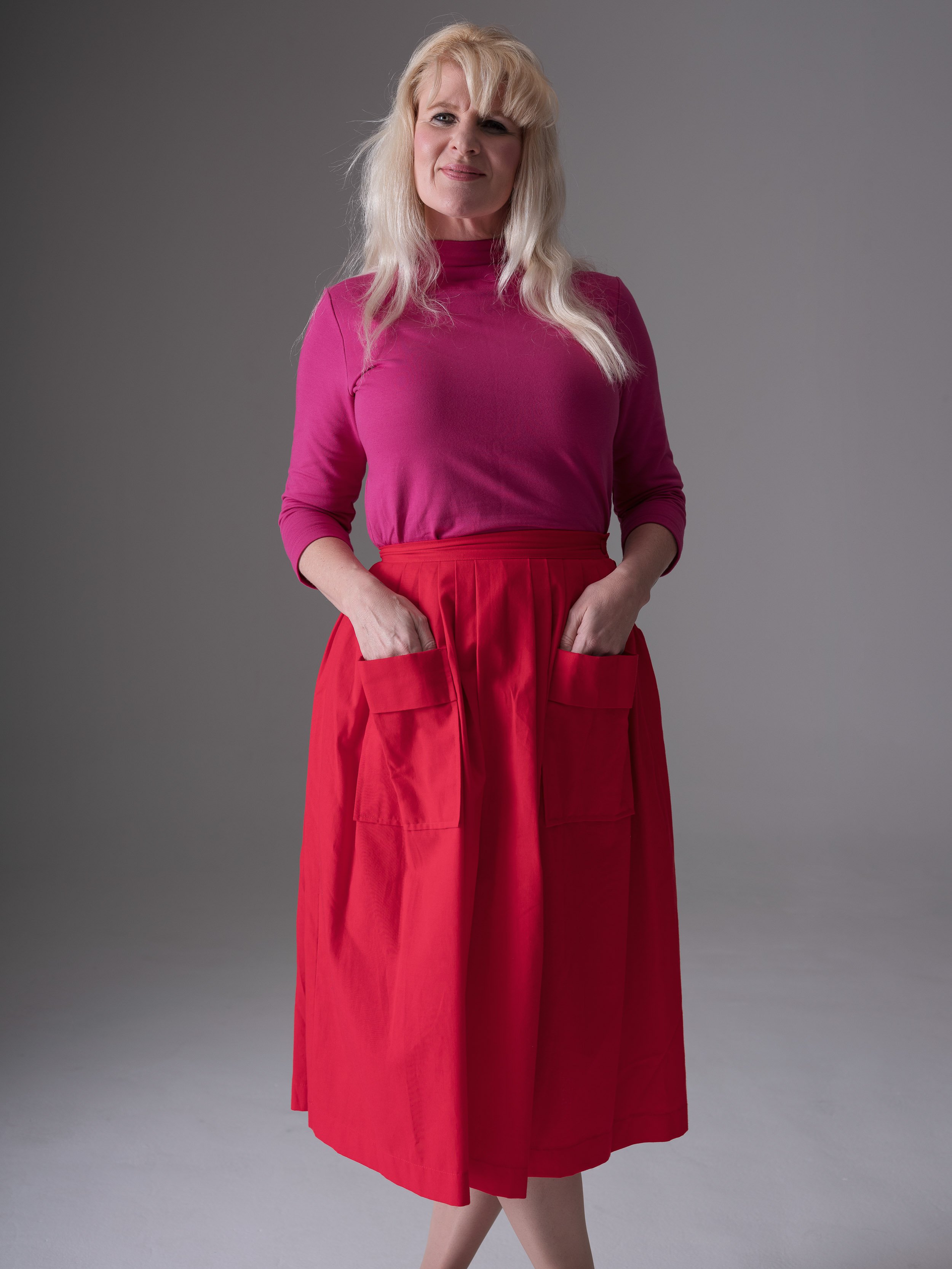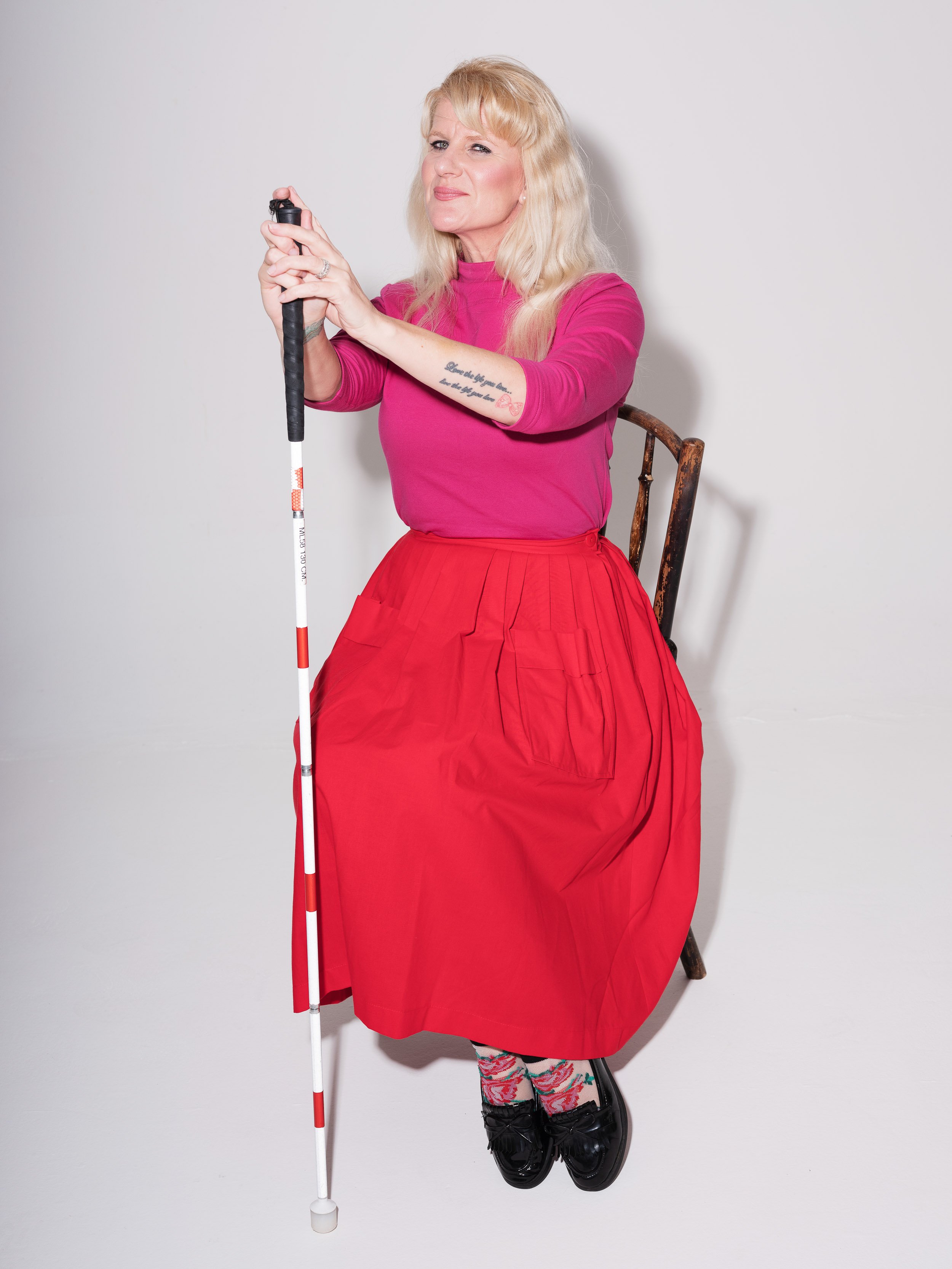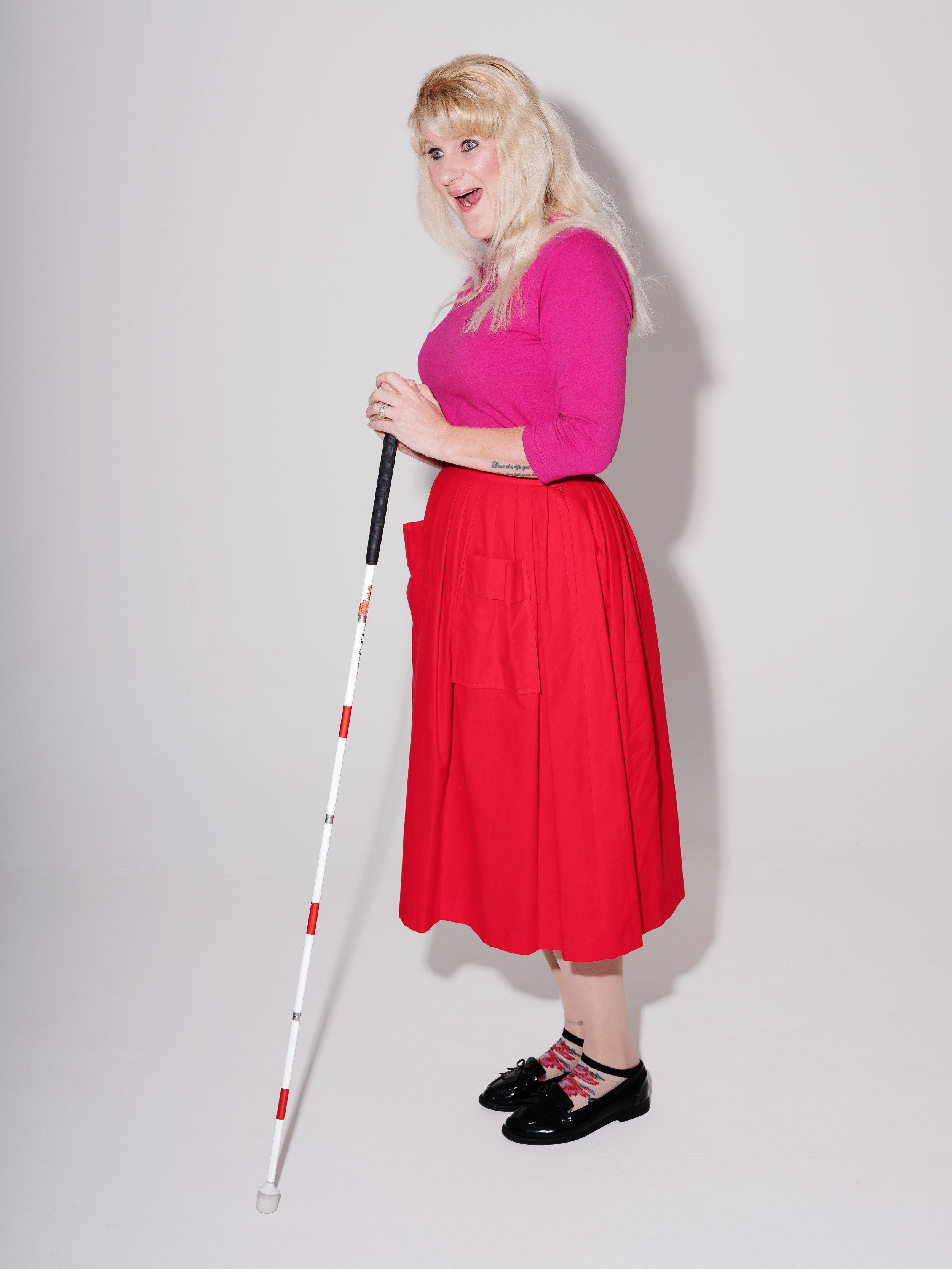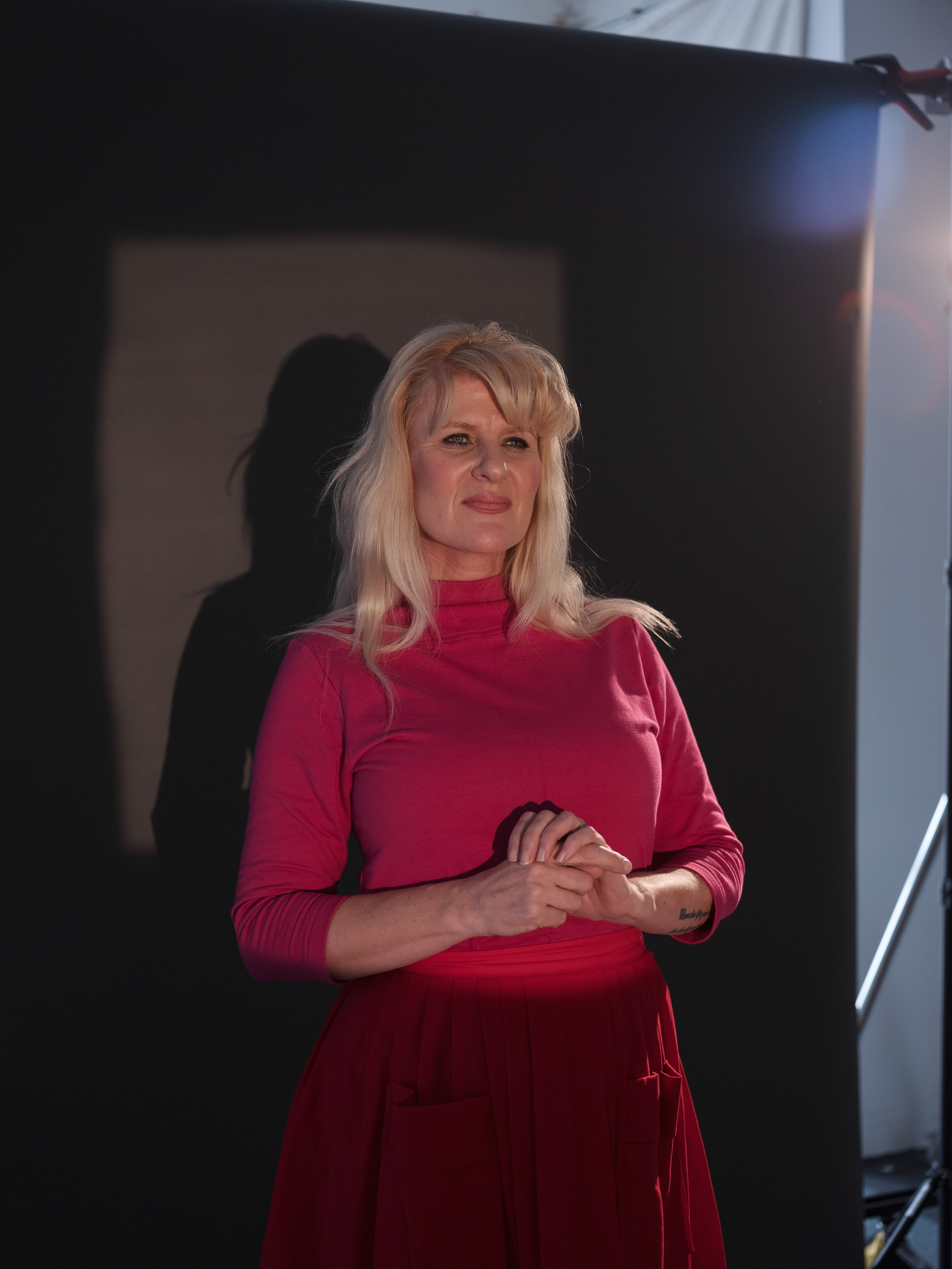Warrior Woman
JO MILNE
CUREUsher
Diagnosed with a devastating genetic condition that causes combined deafness and blindness at just 16 years old, Gateshead-born Jo Milne underwent life-changing surgery at 39 to be able to hear for the first time. She has since worked to raise awareness of Usher syndrome and encourage more investment into finding a cure. Here, the founder of CUREUsher talks about her incredible life and the ongoing battle she faces to change perceptions and be ‘just Jo’.
Interview by Alison Cowie
Photographs by Christopher Owens
Many of us have scrolled past heart-warming videos of babies and toddlers sitting on their parent’s knees, hearing voices for the first time after being fitted with a cochlear implant.
Imagine then, seeing a 39-year-old sat in an equally clinical doctor’s office having the same first-time experience. Check YouTube and you can see just that. Jo Milne heard her first sound just shy of her fourth decade, with the emotional, moving and highly personal moment watched by millions of people worldwide.
However, the life-affirming clip doesn’t show that Jo is also slowly going blind, the result of Usher syndrome, a cruel genetic condition for which there is no cure.
I meet Jo when she arrives at the photo studio. She is dressed in an on-trend pink top and red skirt - that perfectly set off her long blonde tresses - holds a red and white striped mobility cane in front of her, and has husband, Stephen, on her arm.
Stephen is not there to be his wife’s carer but simply to offer a confirmatory word now-and-then that there are no trip hazards as she makes her way across the studio.
Jo is warm, engaging and ready to tell me about her extraordinary life.
Born in Gateshead in 1974, Jo was diagnosed profoundly deaf at two years old when her family’s concerns about her hearing were realised.
It was a devastating moment for her devoted parents and grandparents, but they rallied around the ever-smiling toddler.
Jo was fitted with hearing aids as a child, which were an early indicator of the youngster’s impairment.
“From a very early age, I had to be a self-advocate for my disability,” Jo reflects, “and I've had a lifetime of explaining how to communicate with me and what the best things are to do.”
The family made life as normal as possible for Jo and her sister but tragedy hit the Milne family again when Jo’s parents became concerned that their middle daughter seemed to be having trouble with her sight too.
“My mum took me to the optician when I was about nine because she had a feeling that I couldn't see below me and I kept tripping over things.
“I did well in the optician’s tests, which were all straight ahead of me, and so they said I didn’t have a visual impairment. It’s since become apparent that I was probably partially sighted then,” she adds.
Despite the positive results in the optician’s office, the issues with Jo’s sight persisted and she was eventually diagnosed with Usher syndrome when she was 16 years old.
First recognised in 1914 by Scottish ophthalmologist Charles Usher, the syndrome is the most common genetic cause of combined deafness and blindness.
Information on Usher syndrome in 1990 was limited and unbearably bleak, and having a diagnosis to explain what was happening to Jo brought her little comfort.
“It was very lonely and isolating,” she reflects. “The main thing was there was nobody like me to compare myself to. Had there been, I think it would have been easier.”
Her family again provided Jo with the strength and support she needed and, as she entered adulthood, she began working in the not-for-profit sector.
But her worsening sight meant Jo took the brave decision to undergo major surgery to fit a cochlear implant just before she reached 40.
“There was more risk involved and there was a concern I wouldn’t be able to cope,” she reveals.
Jo describes hearing sound for the first time as overwhelming but ultimately life changing.
Her friends made her a mix tape with songs from each year she’d been alive, and Jo has since become an avid music fan, fascinated by its ability to evoke memories.
“I can now appreciate the times when my mum and dad would talk about music from the 60s or when my sister mentioned a song that reminded her of a birthday party.”
But a cacophony of harsher sounds also exposed Jo to a more hostile world than her silent years had afforded her.
“I realised there were painful sounds too,” she explains. “People shouting in the street, or things clanging, smashing and banging. This world of anger was something I was oblivious to when I was deaf.”
“I've had a lifetime of explaining how to communicate with me and what the best things are to do.”
Jo, who underwent her transformative surgery in 2014, says she’s still on a journey with sound and can still quickly be overcome.
“As my sight deteriorates, my hearing journey is filling in the blanks. It makes me feel less visually impaired because, for example, I can now hear footsteps and know when someone is nearby.
“But on the negative, it can still get overwhelming if things get too loud. Sometimes I just take my implants off for an hour or so to go back to silence before I prepare to put them back on again.”
Jo, now mum to a five-year-old son and a three-year-old daughter, describes life at home as normal.
“I’m just Jo at home - wife to Stephen and mum to Teddy and Maggie. There are some things we’ve had to adapt to, and there are sometimes little accidents with a few tears, but that happens in any house.
“We’re a loving family and we don’t let disability define us.”
Outside of the understanding at home, however, Jo needs to teach others about her disability on an ongoing basis.
“Every time I go out of the house, I have to explain my disability to someone and it does become exhausting,” she says.
Emboldened to help others living with the little-known Usher syndrome, Jo established the CUREUsher charity in 2018.
Jo’s initial goal was focused on enabling more scientific research to find a cure for the condition, known to affect around 400,000 people worldwide. But as the charity has developed, she and Stephen - also a trustee in the charity - have found that building awareness has proved almost as crucial as finding a cure.
CUREUsher has recently created an informational film in partnership with Northumbria Healthcare NHS Foundation Trust, starring Jo and her family, to explain more about the disorder and what it’s like to live with Usher syndrome. Crucially, it explains that red stripes on a person’s mobility cane mean they have hearing as well as sight loss. Red and white checks on a guide dog’s collar indicate the same.
“It’s so simple but not many know what it means,” Jo reflects. “If you’re boarding a train or even just entering a room, it’s important to give people with hearing and sight loss time to understand their bearings and not rush them, but people don’t recognise the red and white.”
Surprisingly, Usher syndrome is a relatively unknown condition among the medical profession too, and CUREUsher has been active in helping educate people in this area.
“When I was in hospital having my children, no one had heard of Usher syndrome so we’ve been working on creating leaflets with more information about the condition,” Jo explains.


“We’re a loving family and we don’t let disability define us.”
CUREUsher now deals with daily enquiries from fellow sufferers of Usher syndrome - thought to be around 10,000 people in the UK – and their families, as well as people keen to know how they can help.
While the pandemic created much-documented problems for people with disabilities, it provided Jo with an opportunity to access members of parliament and influential people in the medical sector keen to help her cause through virtual Zoom calls.
Over the last two years, the charity has worked closely with Northumbria Healthcare NHS Trust to raise more awareness, and the trust is the first of its kind to recognise Usher Syndrome Day, which will take place annually on March 2. The University of Sunderland’s Medical School has also added Usher syndrome to its curriculum to educate the next generation of nurses and paramedics on the disorder.


“Sometimes I sit with my head in my hands asking myself do I really need to justify my disability again?”
Meanwhile, CUREUsher has played a key role in establishing an All-Party Parliamentary Group for Usher syndrome, chaired by Shadow Minister Alex Norris MP.
“The more people who know about the condition, the better,” Jo says. “More awareness means more funding and research.”
Jo remains hopeful that a cure for Usher syndrome will one day become a reality and she is keen to highlight the work of Dr Mariya Moosajee, a consultant ophthalmologist at Moorfield Hospital in London who is leading pioneering research into genetic causes of blindness.
“She’s doing ground-breaking work around Usher syndrome and is very optimistic that a cure can be found,” Jo enthuses.
But despite her seemingly unending drive and positivity, CUREUsher’s founder and role model as to how you can thrive with Usher syndrome can still have her despondent moments.
“I've always been a firm believer that life is for living regardless of whether you have a condition or not,” she says, “but sometimes I sit with my head in my hands asking myself do I really need to justify my disability again?
“Every time I get on a bus or go into a supermarket I have to explain it again? It’s tiring and it does get me down at times.”
Jo can perhaps best be described as a battle weary warrior. She may feel bruised from living with the physical impact of Usher syndrome, and exhausted by the unending need to explain her condition. But like all great warriors, each time she falls, she rises again, ready to rage against her foe until Usher syndrome is beaten not only for her and her family, but for fellow suffers and their loved ones too.
And what’s the easiest thing we can do to support Jo’s Herculean efforts? For starters, we can educate someone on what the red stripes on a mobility cane mean.
Learn more






